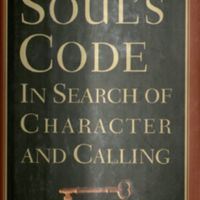The Soul's Code: In Search of Character and Calling
Dublin Core
Title
The Soul's Code: In Search of Character and Calling
Subject
Individuality
Individuality in children
Fate and fatalism
Gifted persons
Individuality in children
Fate and fatalism
Gifted persons
Description
"Plato and the Greeks called it "daimon," the Romans "genius," the Christians "guardian angel"; today we use terms such as "heart," "spirit," and "soul." For James Hillman it is the central and guiding force of his utterly unique and compelling "acorn theory," which proposes that each life is formed by a particular image, an image that is the essence of that life and calls it to a destiny, just as the mighty oak's destiny is written in the tiny acorn. It is a theory that offers a liberating vision of childhood troubles and an exciting approach to themes such as fate and fatalism, character and desire, family influence and freedom, and, most of all, calling - that invisible mystery at the center of every life that speaks to the fundamental question "What is it, in my heart, that I must do, be, and have? And why?"" "The Soul's Code dedicates itself to what is truly innate, not to how it got this way or where it's going. Hillman does not see human beings as results or, worse, victims of their lives, nor does the promise or even seek a "cure"; instead he welcomes the necessity of every aspect of what makes up a life and advocates using "symptoms" as clues to what the daimon demands. Essentially, Hillman believes that there is more to life - to each individual - than can be explained by the traditional "either/or" categories of genetics and environment. His method is to use the extraordinary (an extensive array of examples from Yehudi Menuhin to Jeffrey Dahmer) as a way to inspire the ordinary, as well as urging his readers to reexamine their childhood impulses, fantasies, thoughts, and even accidents, all of which reflect the "blueprints" that give direction to the course of a biography."--Jacket.
Creator
James Hillman
Publisher
New York : Random House
Table Of Contents
In a nutshell: the acorn theory and the redemption of psychology -- Growing down -- The parental fallacy -- Back to the invisibles -- "Esse is percipi": to be is to be perceived -- Neither nature nor nurture-something else -- Penny dreadfuls and pure fantasy -- Disguise -- Fate -- The bad seed -- Mediocrity.
Text Item Type Metadata
Original Format
Book
Citation
James Hillman , “The Soul's Code: In Search of Character and Calling,” Humanities Hub, accessed February 23, 2026, https://humanitieshub.sdsu.edu/omeka/items/show/746.


